Merkel's UK speech: The exclusive club she is joining
- Published
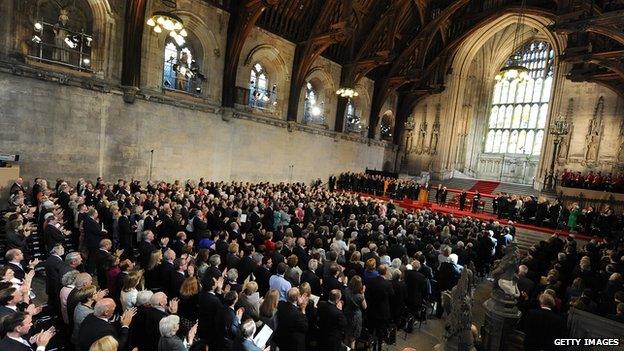
German Chancellor Angela Merkel has addressed both Houses of Parliament, becoming the latest in a long line of dignitaries, external to do so since the first in 1939.

23 March 1939: President of France Albert Lebrun
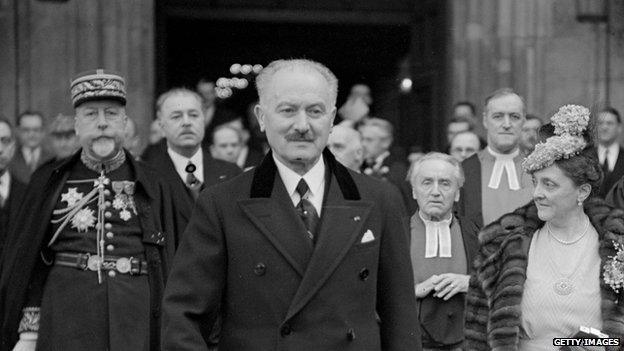

21 October 1942: Prime Minister of South Africa Field Marshal Jan Christiaan Smuts
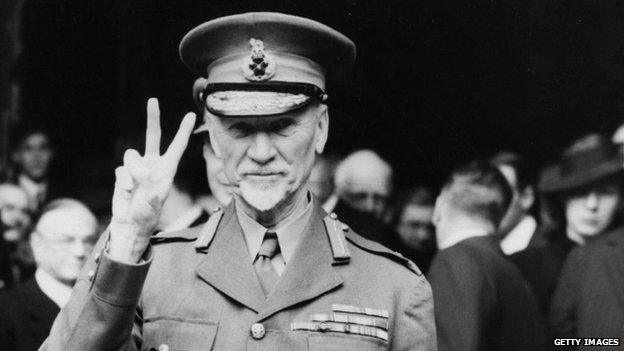
South Africa's PM, who had served in Lloyd George's war cabinet during World War I, found his military expertise was again in demand in Churchill's war cabinet.
The future co-author of the preamble to the UN charter was invited to share his thoughts on war and peace with MPs and peers in Parliament's royal gallery, although the Commons library reports that it was not a "formal presentation".
Parliament itself had sustained severe damage by this period in the Second World War, and Smuts noted: "Irreplaceable treasures of a thousand years of almost uninterrupted progress and culture and peaceful civilisation have disappeared forever.
"But one thing is not lost; one thing, the most precious of all, remains, and has rather increased," he continued. "The soul remains."
He paid tribute to Sir Winston as "the embodiment of the spirit of eternal youth and resilience, the spirit of a great, undying nation in one of the greatest moments of history".
"The stage is set," he declared of the war, "for the last, the offensive phase".

11 May 1944: Prime Minister of Canada Mackenzie King

17 May 1945: King George VI
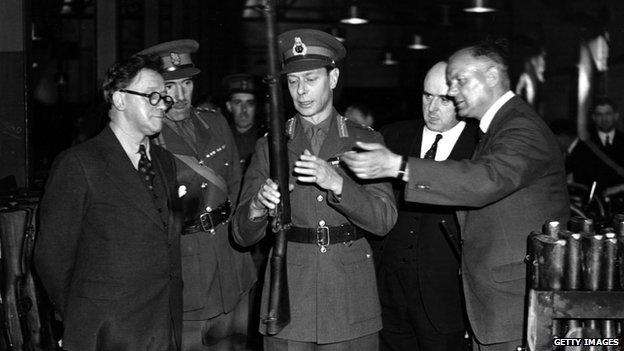
King George VI had visited arms factories during the war
The King celebrated victory in Europe with a trip to Parliament, telling MPs and peers of his gratitude to all of them and his subjects for their wartime service.
"There was visibly present in the royal gallery something immensely venerable and at the same time very much alive," reported the Times.
"The King in his Councils in his Parliaments, the organ that through the centuries has been the very heart of England, ceaselessly driving the life's blood of liberty through the veins and arteries of the nation."

21 August 1945: King George VI
The King returned to Parliament to mark overall victory in World War II.

9 March 1950: French president Vincent Auriol

26 October 1950: King George VI
Opening the new House of Commons chamber, which had been destroyed in World War II, the King delivered a speech to MPs and peers.

22 October 1954: Emperor of Ethiopia Haile Selassie
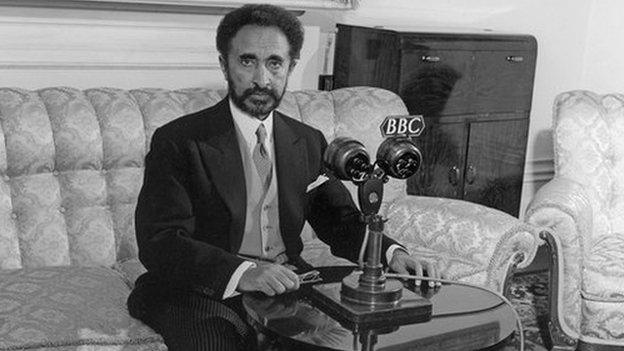

24 April 1956: Soviet PM Nikolai Bulganin and first secretary of the Communist Party Nikita Khrushchev

7 April 1960: French president General Charles de Gaulle
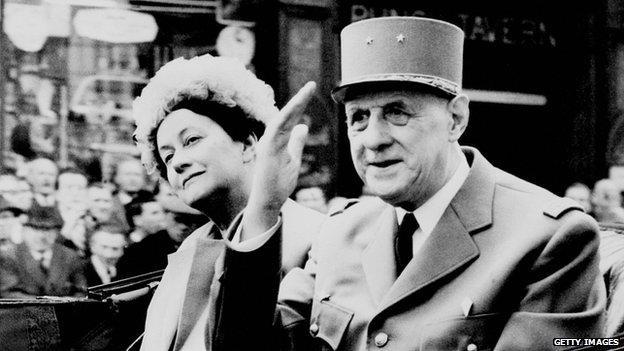
In his Westminster Hall speech, President de Gaulle recalled how the UK, "heroic and alone, took upon herself the liberty of the world".
He expressed sympathy for the "wounds" of the German people, who he said were "yesterday our enemies but who are today a vital part of the West and our common ally".
But the focus of his speech was on disarmament, and he looked forward hopefully to a summit at which PM Harold Macmillan, President Eisenhower, Soviet leader Nikita Khrushchev and he were to discuss the possibility of detente.
France "wishes, above all, stocks of nuclear weapons to be destroyed", he told MPs and peers.
It wasn't to be: the summit was cancelled after a US spy plane was shot down over Russia.

22 June 1965: The Queen
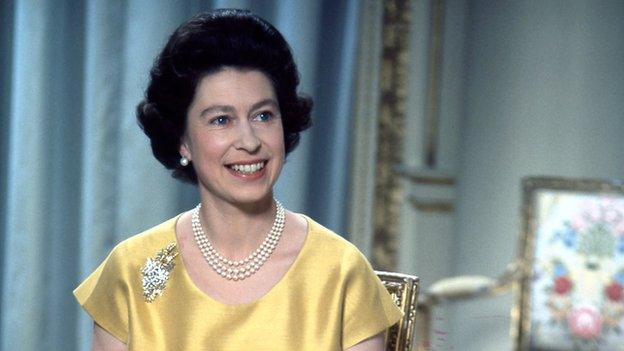
Queen Elizabeth II's first speech to both Houses of Parliament - besides those at the annual state opening of Parliament ceremony - marked the 700th Anniversary of the Parliament of Simon de Montfort.

28 April 1966: U Thant, secretary general of the UN

9 February 1967: Soviet PM Alexei Kosygin

28 April 1969: Italian President Giuseppe Saragat

3 March 1970: Chancellor of West Germany Willy Brandt
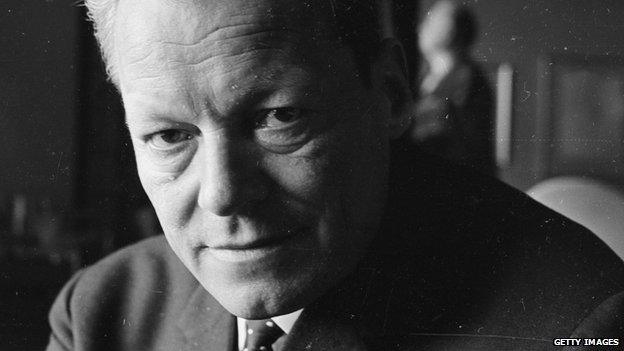
Chancellor Brandt assured MPs and peers in the royal gallery of his support for the UK's application to join the European Economic Community, which he predicted would be enriched by British traditions.
French president de Gaulle had thwarted an earlier UK bid to join.

23 June 1976: French President Valery Giscard d'Estaing

4 May 1977: The Queen
The Queen marked her Silver Jubilee with an address to Parliament.

8 June 1982: US President Ronald Reagan
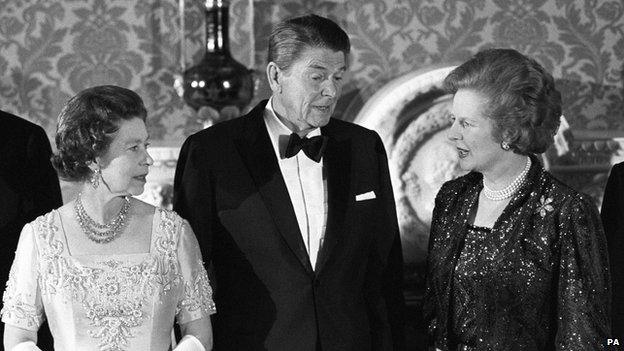
President Reagan rallied Parliament's support for a crusade towards global freedom and democracy that "would leave Marxism-Leninism on the ash-heap of history".
But the Cold War was not the only conflict coinciding with his visit: UK troops were closing in on victory in the Falklands.
"Those young men are not fighting for mere real estate," the president reminded MPs and peers in the royal gallery.
"They fight for a cause, for the belief that armed aggression must not be allowed to succeed, and that people must participate in the decisions of government under the rule of law."

24 October 1984: French President Francois Mitterrand

18 December 1984: Future General Secretary of the Soviet Communist Party Mikhail Gorbachev
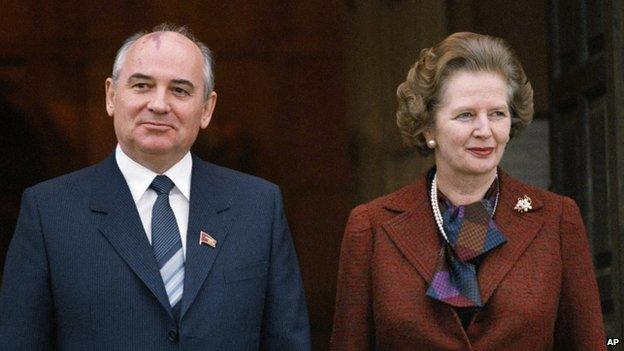
After meeting communist chief Mikhail Gorbachev at Chequers, then Conservative PM Margaret Thatcher declared: "I like Mr Gorbachev. We can do business together."
The future Soviet leader went on to address an informal meeting of MPs and peers, declaring: "For all that separates us, we have one planet and Europe is our common home, not a theatre of operations."
But his remarks became less diplomatic after Conservative former minister Norman St John-Stevas asked him about Soviet oppression of religion.
"I could quote a few facts about human rights in the UK," he said. "You persecute entire communities and nationalities. You have got 2.3 million unemployed."
The Times reported that one MP later joked he wished unemployment was as low as that.

23 January 1986: Prime Minister of Israel Shimon Peres

28 April 1986: King of Spain Juan Carlos
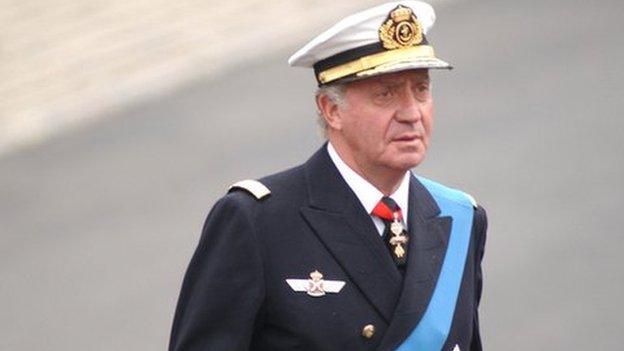

2 July 1986: President of West Germany Richard Von Weizsäcker

20 July 1988: The Queen
The Queen marked the tercentenary of the Revolution of 1688-89 and the Bill of Rights with another speech to MPs and peers.

08 May 1989: President of Nicaragua Daniel Ortega

24 October 1990: Italian President Francesco Cossiga
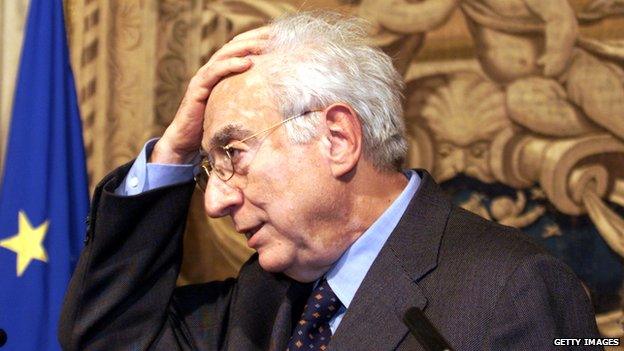
The Christian Democratic party's Francesco Cossiga used his address to MPs and peers in the royal gallery to "take Margaret Thatcher to task", according to the Times.
She was due to attend a European summit in Rome four days later, and President Cossiga urged her to adopt a "more idealistic approach" to the European Community, the paper added.
His advocacy was apparently unpersuasive. After the Rome summit, PM Thatcher reported back to MPs that she had not taken kindly to federalist Commission President Jacques Delors' aim to make the European Parliament the most powerful democratic institution in Europe, with the Commission working as the executive and the Council of Ministers acting as the senate.
"No! No! No!" she declared.

10 November 1992: President of the Russian Federation Boris Yeltsin
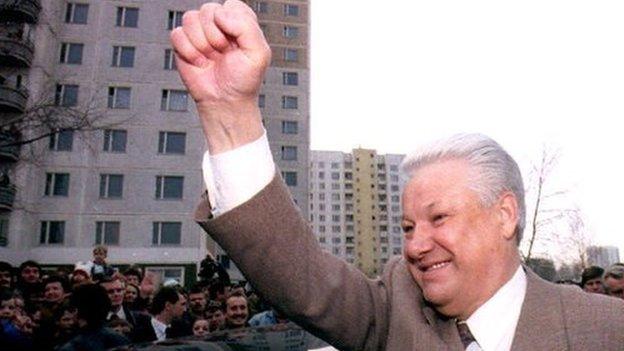

28 April 1993: President of Portugal Mario Soares

5 May 1993: Nelson Mandela

7 December 1993: Mikhail Gorbachev

6 May 1995: The Queen
The Queen marked the 50th anniversary of Victory in Europe Day with a speech to MPs and peers.

29 November 1995: US President Bill Clinton
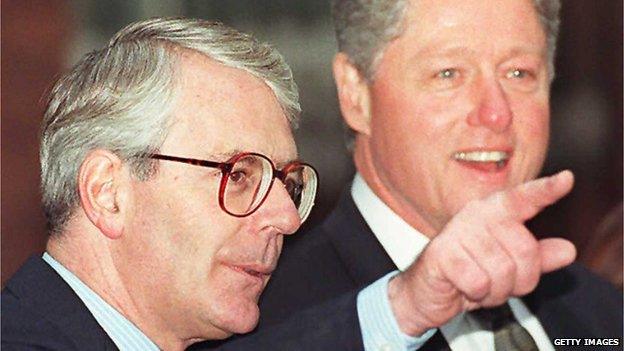
PM Sir John Major "appeared overcome with emotion" as President Clinton paid tribute to the Conservative's "peacemaking role and spoke of a Northern Ireland where 'the guns are quiet and the children play without fear'," according to the Daily Mail's coverage of his speech to MPs and peers.
"I applaud the prime minister for taking this risk for peace," he had said.
"It is always a hard choice, the choice for peace, for success is far from guaranteed, and even if you fail, there will be those who resent you for trying. But it is the right thing to do. And in the end, the right will win."
The Scotsman tried valiantly to resist the famously charismatic Clinton, describing him as a "purveyor of folksy pieces of meaningless wisdom".
"Mr Clinton said: 'The only way to abolish war is to make peace heroic.' True, but what does it mean?" the paper commented, before succumbing.
"In spite of the simplicity and embarrassingly cliched nature of most of it, it was a good speech," it reported.
"It was refreshing to hear someone speak of high principles... Mr Clinton got away with it, not only because it was novel but because his delivery was superb."

15 May 1996: French President Jacques Chirac

11 July 1996: President of South Africa Nelson Mandela
DL - Mandela parliament
In his second speech to MPs and peers, President Mandela paid tribute to anti-apartheid British politicians.
Labour peer Lord Brockway "was as concerned about our liberty as he was about the independence of India", he said.
He also recalled ex-Conservative PM Harold Macmillan's historic visit to Cape Town in 1960 and his historic speech declaring: "The wind of change is blowing through this country."
"Let our peoples," the president concluded, "join hands to build on what we have achieved together and help construct a humane African world, whose emergence will say a new universal order is born in which we are each our brother's keeper."

16 July 1996: The Dalai Lama
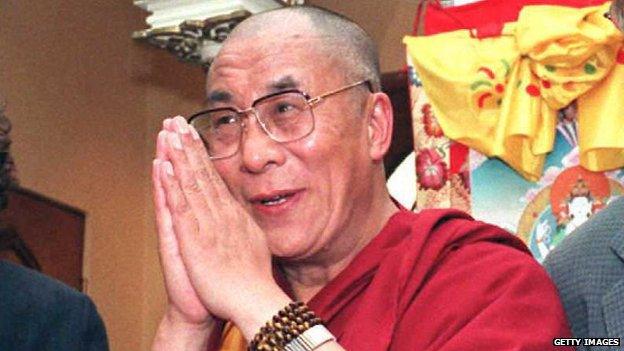
In an informal meeting of the all-party parliamentary group on Tibet, the Dalai Lama urged the UK to exert influence on China.
"The reality today is that Tibet is an occupied country under colonial rule. This is the essential issue which must be addressed and resolved through negotiations," he told MPs and peers.
"Tibet - an ancient nation with a unique culture and civilisation - is disappearing fast. In endeavouring to protect my nation from this catastrophe, I have always sought to be guided by realism, moderation and patience.
"However, it has now become clear that our efforts alone are not sufficient to bring the Chinese government to the negotiating table."
According to the Independent, a Chinese foreign ministry spokesman responded: "By inviting the Dalai Lama to visit Britain and offering him a forum, the Tibetan group of the British House of Commons abets the Dalai's action to split the motherland. It will bring about adverse effects to the Sino-British relations."

29 October 1998: Argentine President Carlos Menem

6 July 2000: Prime Minister of Australia John Howard
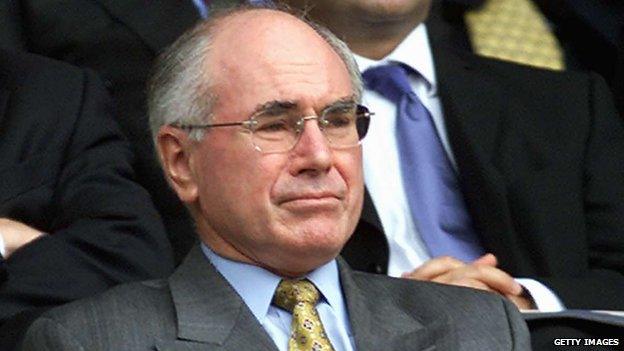
Marking the 100th anniversary of the Australian federation, PM John Howard addressed MPs and peers in the royal gallery with "a graceful speech saying what a great place Australia was", according to the Guardian's Simon Hoggart.

30 April 2002: The Queen

8 May 2007: Former UN secretary general Kofi Annan

15 May 2007: Irish Taoiseach Bertie Ahern
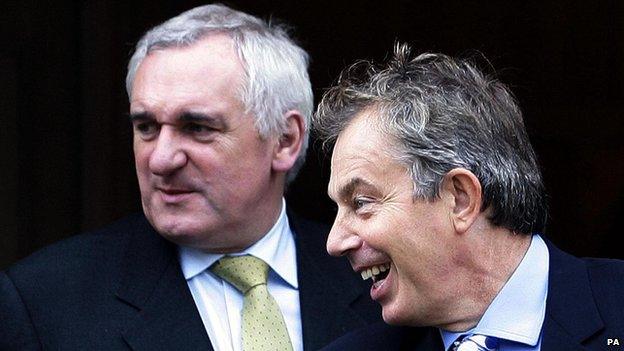
"Let us consign arguments over the past to the annals of the past, as we make history instead of being doomed to repeat it," said Bertie Ahern, the first Irish Taoiseach to address both Houses of Parliament.
Mr Ahern may have been "lacking in suave elegance," reported the Independent, "but as usual that was more than made up for by his evident abilities and all-round political competence."
Labour PM Tony Blair described him as "a true friend of the British people, a man who is changing the history of his own country and of these islands".

26 March 2008: French President Nicolas Sarkozy

19 November 2008: Israeli President Shimon Peres

1 April 2009: President of Mexico Felipe Calderon Hinojosa

17 September 2010: Pope Benedict XVI
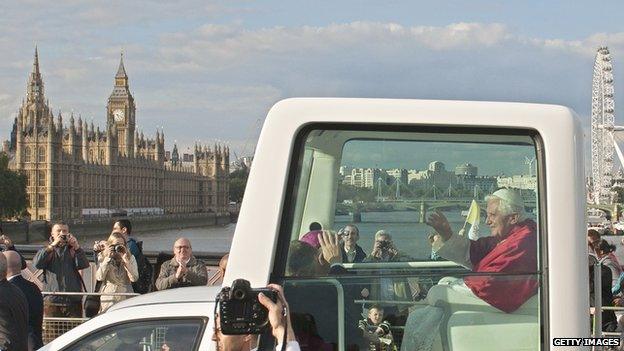
The Pope warned MPs and peers in Westminster Hall that religion - and Christianity in particular - was "being marginalised" around the world.
"There are those who would advocate that the voice of religion be silenced, or at least relegated to the purely private sphere," he said.
"There are those who argue that the public celebration of festivals such as Christmas should be discouraged, in the questionable belief that it might somehow offend those of other religions or none."
BBC correspondent Peter Hunt described the speech at Westminster Hall as "a rallying call, and a plea - for religion not to be squeezed out by secular society".
Two and a half years later, Benedict XVI became the first pope in centuries to resign.

25 May 2011: US President Barack Obama
The UK and US were at a "pivotal moment" in their relationship and "profound challenges" lay ahead, US President Barack Obama told MPs and peers in his Westminster Hall speech.
He praised the role of the UK in spreading the ideals of democracy around the world, quoting Sir Winston Churchill, who said the Magna Carta, Bill of Rights, habeas corpus, trial by jury and common law "find their most famous expression in the American Declaration of Independence".

20 March 2012: The Queen
Highlights of the Queen's visit to Parliament event to celebrate her Diamond Jubilee.
The Queen said she would rededicate herself to the service of the UK and its people as she celebrated her Diamond Jubilee.
She told MPs and peers in Westminster Hall that the commemoration of her 60 years on the throne was a chance "to come together in a spirit of neighbourliness and celebration".
The Queen also praised Prince Philip for being "a constant strength and guide" over the decades.

21 June 2012: Burmese opposition leader Aung San Suu Kyi
Burmese opposition leader Aung San Suu Kyi urged the UK to support the shift towards democracy in Burma in her historic address to both Houses of Parliament.
"My country today stands at the start of a journey towards, I hope, a better future. So many hills remain to be climbed, chasms to be bridged, obstacles to be breached," she said.
"Our own determination can get us so far. The support of the people of Britain and of peoples around the world can get us so much further."

20 March 2013: President of Malawi Joyce Banda
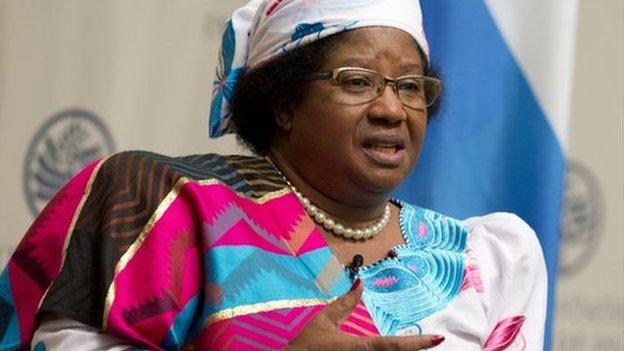

13 June 2013: Prime Minister of Canada Stephen Harper

5 November 2013: South Korean President Park Geun-hye
- Published27 February 2014